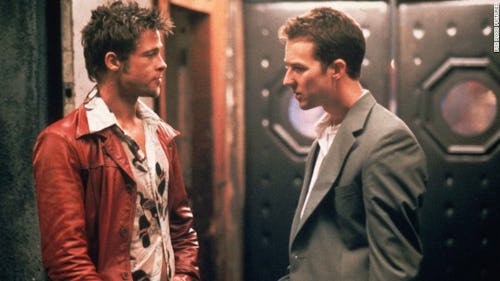
One of the more well-known twist endings in the last 25 years of movies comes from David Fincher’s Fight Club. But if you’re seeing the film in China, it comes with a bonus shocker: an edited version cuts off the original ending and instead replaces it with a title card that explains how the revolution is foiled by authorities.
In the actual ending of Fight Club, the unnamed protagonist (Edward Norton) kills Tyler Durden — who is revealed to be a projection of the protagonist’s own dissociated identity — only to witness the success of his anarchic plan of blowing up the high-rises around them to wipe out everyone’s debts.
This rebellious conclusion, though, is completely cut off in China. Instead, it is replaced by a title card in English, reading a neat, state-friendly outcome: “The police rapidly figured out the whole plan and arrested all criminals, successfully preventing the bomb from exploding. After the trial, Tyler was sent to lunatic asylum receiving psychological treatment. He was discharged from the hospital in 2012.”
The altered version is playing on Tencent, China’s biggest streaming platform, where it is not entirely uncommon to carry films that have been censored and edited. According to Variety, recent films like Bohemian Rhapsody and Alien: Covenant had scenes cut due to their depiction of gay sexuality. In this case, though, the actual insertion of content, with a title card that matches the film’s original font, likely indicates that the company with distribution rights to China altered the film themselves to pre-empt China’s censorship rules and sell the film to Tencent.
It is typical for any film to undergo rigorous state censorship tests in China, and many American films fail to make it through the process. Domestic and foreign films alike must be approved or edited, avoiding content that the state deems to be promoting or featuring anything potentially subversive. It wasn’t until 2016, in fact, that a ban was lifted on any film starring Brad Pitt; the actor had garnered a Chinese blacklist all the way back in 1997 for his role in Seven Years in Tibet, which focuses in part on his character’s friendship with the Dalai Lama in a Chinese-occupied Tibet.
In this case, all it took was taking out a couple of minutes or so of the film — and, ironically, its concluding message of anti-capitalist triumph — to make it through. In China, even the fictional revolution will not be televised.







